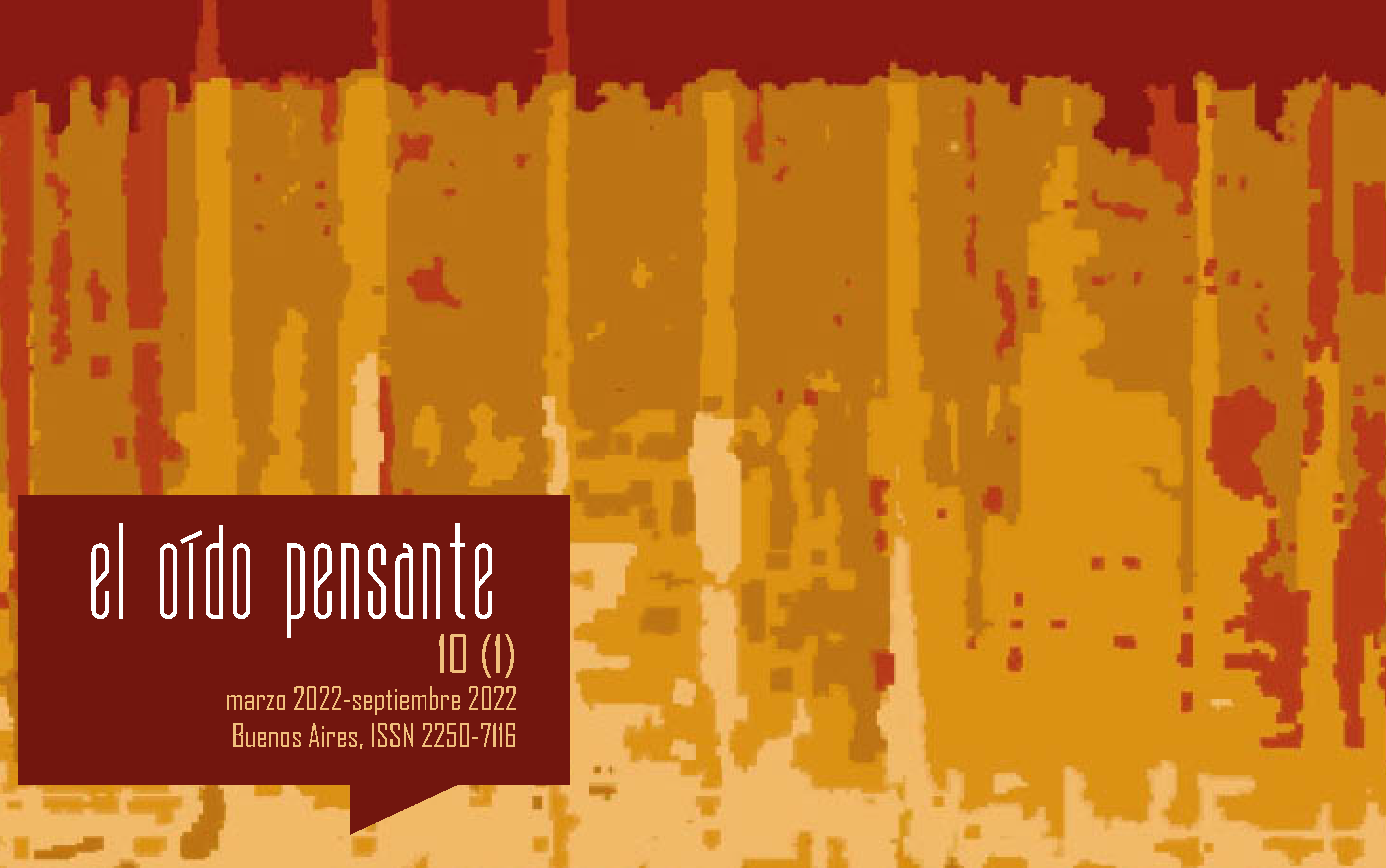The Music Genre Today: Reflections in a Digital and Globalized Context
Abstract
This article discusses how musical genres operate in the current context, dominated by the processes of globalization and digitalization of neoliberal capitalism. These have caused music genres to be articulated by two apparently antagonistic forces, which are mutually dependent: generification and individualization. In order to understand how both of them act, their impact on the production, intermediation, infomediation and consumption of music will be analyzed. This text intends to reflect on how all kinds of music (regardless of their origin or status) can be converted into musical genres, following the way in which this concept has been understood from Western popular music.Downloads
References
Beer, D. (2013). Genre, Boundary Drawing and the Classificatory Imagination. Cultural Sociology, 7(2). doi: https://doi.org/10.1177/1749975512473461
Biddle, I. (2011). Music, Masculinity and the Claims of History: The Austro-German Tradition from Hegel to Freud. Farnham, Surrey: Ashgate.
Blacking, J. (2015). ¿Hay música en el hombre? (2ª ed.). Madrid: Alianza.
Bonini T. y Gandini, A. (2019). “First Week is Editorial, Second Week is Algorithmic”: Platform Gatekeepers and the Platformisation of Music Curation. Social Media + Society 5(4). doi: https://doi.org/10.1177/2056305119880006
Born, G. y Haworth, C. (2017). From Microsound to Vaporwave: Internet-Mediated Musics, Online Methods, and Genre. Music and Letters, 98(4), 601-647. doi: https://doi.org/10.1093/ml/gcx095
Brackett, D. (2016). Categorizing Sound: Genre and Twentieth-Century Popular Music. Los Ángeles: University of California Press.
Celma, Ò. (2010). Music Recommendation and Discovery. The Long Tail, Long Fail, and Long Play in the Digital Music Space. Nueva York: Springer.
Dahlhaus, C. (1983). Foundations of Music History. Cambridge: Cambridge University Press.
Derrida, J. (1980). The Law of Genre. Critical Inquiry, 7(1), 55-81.
Drott, E. (2013). The End(s) of Genre. Journal of Music Theory, 57(1), 1-45. doi: https://doi.org/10.1215/00222909-2017097
Drott, E. (2018). Music as a Technology of Surveillance. Journal of the Society for American Music, 12(3), 233-267. doi: https://doi.org/10.1017/S1752196318000196
Duff, D. (Ed.) (2014 [2000]). Modern Genre Theory (2ª ed.). Londres y Nueva York: Routledge.
The Echo Nest. (16/1/1994). The Future of Music Genres is Here [Post de blog]. Recuperado de https://blog.echonest.com/post/73516217273/the-future-of-music-genres-is-here
Eriksson, M. et al. (2019). Spotify Teardown. Inside the Black Box of Streaming Music. Cambridge, Massachusetts: MIT Press.
Fabbri, F. (1999). Browsing Music Spaces: Categories and the Musical Mind. Tagg.org. Recuperado de https://www.tagg.org/others/ffabbri9907.html
Fabbri, F. (2016). How Genres are Born, Change, Die: Conventions, Communities and Diachronic Processes. En S. Hawkins (Ed.). Critical Musicological Reflections: Essays in Honour of Derek B. Scott (pp. 179-192). Londres y Nueva York: Routledge.
Frow, J. (2006). Genre: The New Critical Idiom. Nueva York: Routledge.
Gelbart, M. (2007). The Invention of “Folk Music” and “Art Music”. Emerging Categories from Ossian to Wagner. Cambridge: Cambridge University Press.
Golder, S. A. y Huberman, B. A. (2005). The Structure of Collaborative Tagging Systems. Journal of Information Science, 32(2). Recuperado de https://arxiv.org/ftp/cs/papers/0508/0508082.pdf
Guaus, E. (2009). Audio Content Processing for Automatic Music Genre Classification: Description, Databases, and Classifiers. (tesis de doctorado). Universidad Pompeu Fabra, Barcelona, España.
Hagen, A. N. (2015). The Playlist Experience: Personal Playlists in Music Streaming Services. Popular Music and Society, 38(5), 625-645. doi: https://doi.org/10.1080/03007766.2015.1021174
Han, B.-C. (2017). La sociedad del cansancio. Barcelona: Herder.
Hesmondhalgh, D., Jones, E. y Rauh, A. (2019). SoundCloud and Bandcamp as Alternative Music Platforms. Social Media + Society, 5(4). doi: https://doi.org/10.1177/2056305119883429
Holt, F. (2003). Genre Formation in Popular Music. Musik & Forskning, 28, 77-96.
Holt, F. (2007). Genre in Popular Music. Chicago y Londres: University of Chicago Press.
Karatani, K. (2005). Transcritique: On Kant and Marx. Cambridge, Massachusetts: MIT Press.
Kjus, Y. (2016). Musical Exploration via Streaming Services: The Norwegian Experience. Popular Communication, 14(3), 127-136. doi: https://doi.org/10.1080/15405702.2016.1193183
Knees, P. y Schedl, M. (2016). Music Similarity and Retrieval: An Introduction to Audio- and Web- Based Strategies. Nueva York: Springer.
Krogh, M. (2019). Music-Genre Abstraction, Dissemination and Trajectories. Danish Musicology Online, 9, 83-108. Recuperado de http://www.danishmusicologyonline.dk/arkiv/arkiv_dmo/dmo_09/dmo_09_artikel_04.pdf
McKay, C. y Fujinaga, I. (2006). Musical Genre Classification: Is it Worth Pursuing and How Can it Be Improved? En 7th International Conference on Music Information Retrieval (ISMIR-06) (pp. 101-106). Victoria, Columbia Británica. Recuperado de http://www.music.mcgill.ca/~cmckay/papers/musictech/ISMIR_2006_Genre.pdf
McLeod, K. (2001). Genres, Subgenres, Sub‐Subgenres and More: Musical and Social Differentiation Within Electronic/Dance Music Communities. Journal of Popular Music Studies, 13(1), 59-75. doi: https://doi.org/10.1111/j.1533-1598.2001.tb00013.x
Moore, A. F. (2001). Categorical Conventions in Music Discourse: Style and Genre. Music & Letters, 82(3), 432-442.
Morris, J. W. (2015). Curation by Code: Infomediaries and the Data Mining of Taste. European Journal of Cultural Studies, 18(4-5), 446-463. doi: https://doi.org/10.1177/1367549415577387
Negus, K. (1999). Music Genre and Corporate Cultures. Londres: Routledge.
Ochoa, A. M. (2003). Músicas locales en tiempos de globalización. Buenos Aires: Grupo Editorial Norma.
Peterson, R. A. (2005). Problems in Comparative Research: The Example of Omnivorousness. Poetics, 33(5-6), 257-282. doi: https://doi.org/10.1016/j.poetic.2005.10.002
Prior, P. A. (2009). From Speech Genres to Mediated Multimodal Genre Systems: Bakhtin, Voloshinov, and the Question of Writing. En C. Bazerman, A. Bonini y D. Figueiredo (Eds.). Genre in a Changing World (pp. 17-34). San Francisco: Parlor Press.
Ramírez, J. y Flores, M. J. (2020). Machine Learning for Music Genre: Multifaceted Review and Experimentation with Audioset. Journal of Intelligent Information Systems, 55, 469-499. doi http://dx.doi.org/10.1007/s10844-019-00582-9
Razlogova, E. (2013). The Past and Future of Music Listening: Between Freeform DJs and Recommendation Algorithms. En J. Loviglio y M. Hilmes (Eds.). Radio’s New Wave. Global Sound in the Digital Era (pp. 62-76). Londres y Nueva York: Routledge.
Regev, M. (2013). Pop-Rock Music: Aesthetic Cosmopolitanism in Late Modernity. Cambridge: Polity.
Ross, B. H. y Spalding, T. L. (1994). Concepts and Categories. En R.J. Sternberg (Ed.). Handbook of Perception and Cognition. Thinking and Problem Solving (pp. 119-148). Academic Press. doi: https://doi.org/10.1016/B978-0-08-057299-4.50010-4
Sandywell, B. y Beer, D. (2005). Stylistic Morphing: Notes on the Digitisation of Contemporary Music Culture. Convergence: The International Journal of Research into New Media Technologies, 11(4), 106-121. doi: https://doi.org/10.1177//1354856505061057
Stirner, M. (1976). El único y su propiedad. Buenos Aires: Libros de Anarres.
Striphas, T. (2015). Algorithmic Culture. European Journal of Cultural Studies, 18(4-5), 395-412. doi: https://doi.org/10.1177/1367549415577392
Taylor, T. D. (2016). Music and Capitalism: A History of the Present. Londres y Chicago: University of Chicago Press.
Tepper, S. J. y Hargittai, E. (2009). Pathways to Music Exploration in a Digital Age. Poetics, 37 (3), 227-249. doi: https://doi.org/10.1016/j.poetic.2009.03.003
Todorov, T. (1976). The Origin of Genres. New Literary History, 8(1), 159-170.
Toynbee, J. (2000). Making Popular Music: Musicians, Creativity and Institutions. Londres: Bloomsbury Academic.
Uricchio, W. (2017). Data, Culture and the Ambivalence of Algorithms. En M. T. Schäfer y K. van Es (Eds.). The Datafied Society: Studying Culture through Data (pp. 125-138). Amsterdam: Amsterdam University Press.























